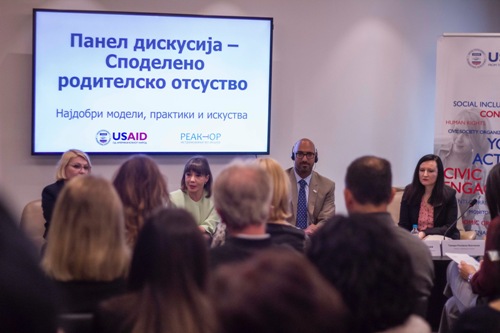
Today, March 26, 2019, a panel discussion was held on shared parental leave, its importance, best experiences and global practices. Do we need to change the parental leave model in Republic of North Macedonia, what are the ways to advance gender equality, some of the best models and practices around the world, were some of the topics discussed by panelists at today’s event organized by Reactor – Research in Action supported by the USAID Civic Engagement Project.
Ms. Mila Carovska, Minister of Labor and Social Policy and Mr. Edward Gonzalez, USAID General Development Office Director, addressed the audience. As part of the panel, Marija Bashevska, President of Reactor – Research in Action, addressed the audience, saying: “Both research and practice show that paternity leave has a positive effect on children’s development, on the distribution of childcare and unpaid work in the home, leads to increased economic activity of women, reduces income and pension inequality between women and men, and significantly contributes towards gender equality and the overall development of societies.”
She added that, “The advantages of introducing a parental leave model that recognizes the importance of the father’s role in caring for children are numerous. Therefore, we believe that changes are needed in the Labor Law, which will include the introduction of three different types of leave – maternal, paternal and parental, as recommended by the International Labor Organization.”
Mr. Benjamin Perks, UNICEF Representative in North Macedonia, Ms. Orhideja Shurbanovska, PhD, Institute of Psychology, Mr. Angel Gina, a father who has used parental leave in the Republic of North Macedonia, addressed the audience at the event, which was attended by representatives from the academia, relevant institutions and civil society.
This discussion contributes to the debate on the need to adopt a new model that will advance parental rights in the country, positively affecting children’s development and gender equality in the country, and will harmonize the Macedonian legislation with EU legislation where shared parental leave is introduced as an unavoidable practice for Member States.